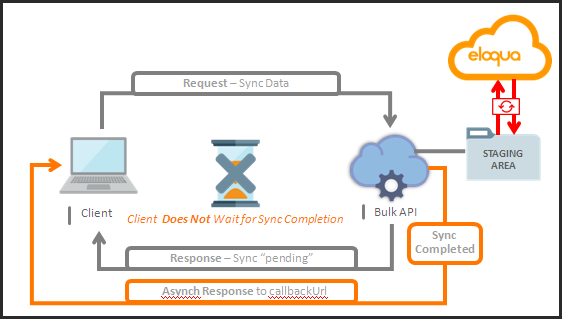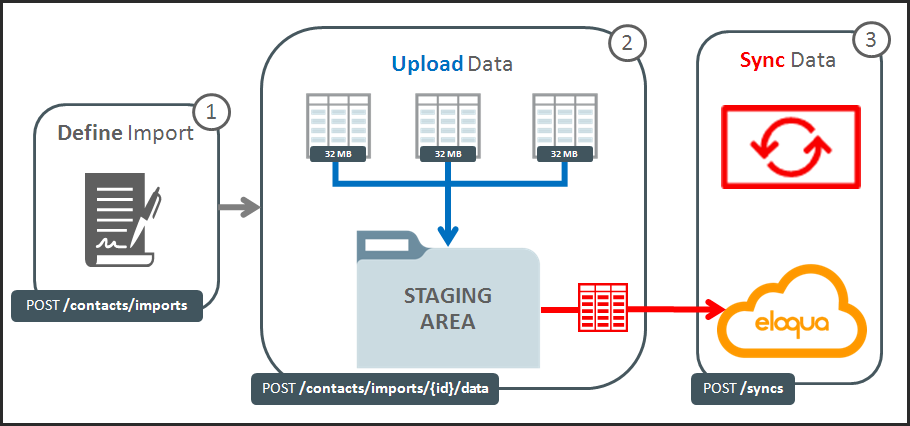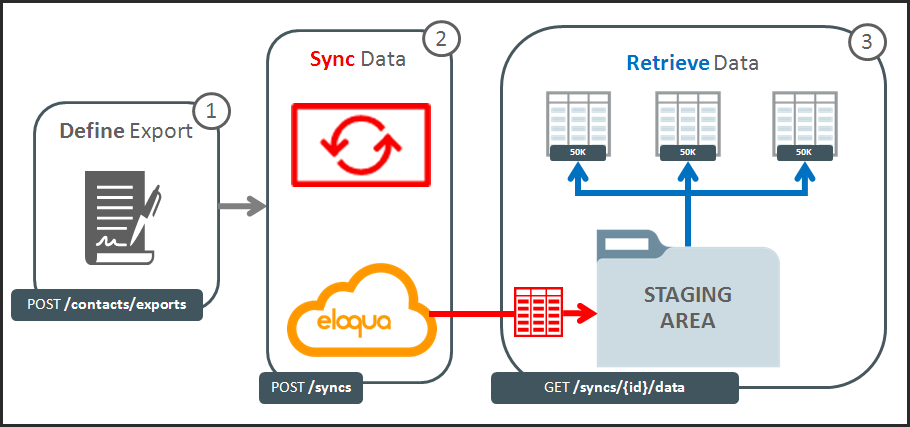Eloqua Developer Resources and Frequently Asked Questions
Learn about useful tools and frequently asked questions when working with the Eloqua APIs and Developer Framework.
What tools are recommended for using / troubleshooting Eloqua's APIs?
| Tool | Use for | Notes |
|---|---|---|
| Postman (App) | Placing any Eloqua API request when you have an Eloqua user account in the instance | |
| cURL (Command line tool) |
|
|
| Online JSON Viewer | Viewing and formatting JSON | |
| JSONLint | Validating JSON | |
| TimestampConvert | Converting Unix timestamps (this is what the Application API uses for timestamps it creates) | |
| Savvy Time: EST to UTC Converter | Converting EST to UTC (all Eloqua fields are in ET, so this is useful, and the Bulk API uses UTC for the timestamps it creates) |
Frequently Asked Questions
| Question | Answer | ||||||||||||||||||||||||||||||||||||||||||||
|---|---|---|---|---|---|---|---|---|---|---|---|---|---|---|---|---|---|---|---|---|---|---|---|---|---|---|---|---|---|---|---|---|---|---|---|---|---|---|---|---|---|---|---|---|---|
|
Where can I find resources for using the APIs and App Developer Framework? |
|
||||||||||||||||||||||||||||||||||||||||||||
|
What if I am using an endpoint that is not included in any of our official documentation (Developer Help Center / Swagger Endpoint Docs)? |
The endpoint is not officially supported or maintained, and usage of this endpoint is at your own risk, which includes they may change breaking a built integration, usage is not documented or supported, and there could be performance issues. Please submit a Feature Request with a detailed use case, so it could be considered to be supported in the future. |
||||||||||||||||||||||||||||||||||||||||||||
|
What are some reasons why endpoints are not supported? |
When it comes to the Application API endpoints, when an endpoint is unsupported, typically it falls into two categories of why:
Please submit a Feature Request with a detailed use case, so it could be considered to be supported in the future. |
||||||||||||||||||||||||||||||||||||||||||||
|
What APIs should I use? Should I use the Developer Framework? |
Summary of key features helps determine what will be needed for an integration.
It’s common for integrations to include 2 out of 3, if not all of the APIs and Developer Framework.
See Selecting an API for more information. |
||||||||||||||||||||||||||||||||||||||||||||
|
I am trying to use an Application API URL parameter (e.g. search, orderBy) and there is inconsistent behavior across endpoints. Is this a bug? |
It's a bug if the capability worked previously and no longer works. When it comes to the Application API endpoints and the URL parameters, when something doesn't work it typically falls into two categories of why:
Please submit a Feature Request with a detailed use case, so it could be considered to be supported in the future. |
||||||||||||||||||||||||||||||||||||||||||||
|
There is a property listed in the official Swagger docs that is not returned by the API endpoint. Is this a bug? |
If the property is not returned at complete depth it is not used by the endpoint. In the future we are looking at improving our Swagger docs to not show properties that are not used by the endpoint. |
||||||||||||||||||||||||||||||||||||||||||||
|
I am exporting all of my activities using the Bulk API. When I accumulate activities exported via the Bulk API, metrics are not matching what I see an Insight. Why wouldn't they match? |
The are two primary reasons they don't match:
|
||||||||||||||||||||||||||||||||||||||||||||
|
Are there any best practices or resources for exporting all activities via the Bulk API? |
Exporting All Eloqua Activities Using the Bulk API: Flowchart, Best Practices, and Resources |
||||||||||||||||||||||||||||||||||||||||||||
|
I am having trouble visualizing the Bulk API pattern? Are there any visual diagrams? |
Asynchronous Flow
Importing Data
Exporting Data
|
||||||||||||||||||||||||||||||||||||||||||||
|
My Application API request is timing out. Why is this happening? What can I do to resolve this? |
Given the Application API is synchronous, if there are timeouts, the number of assets returned in a request should be reduced, if retrieving data, and, the amount of data in a single request should be reduced if uploading data. Whether retrieving or posting data, this may also indicate that you need to place more time between requests or make less simultaneous requests. Retrieving all assets using the Application API Example When retrieving data, the number of assets returned per request can be reduced using the
Continuing this example, if you only need to retrieve modified Campaigns on a daily basis after initial retrieval of all assets, the
Have you tried using the Bulk API? When working with large volumes of data, it'd be recommended to look at using the Bulk API instead of the Application API. |
||||||||||||||||||||||||||||||||||||||||||||
|
I am coming close to the Bulk API syncs soft limit, or am already over this limit for one or more sync types. Am I going to get shut down? What's the impact of going over? |
We want to encourage app/Bulk API usage, as long as app/Bulk API usage is not generating abusive API behavior. We advise not getting too caught up with the soft limit for Bulk API syncs, unless going over significantly, and/or observing performance issues related to the Bulk API load. If you are going over this limit for one or more sync types, the chances of performance issues will increase with volume (meaning the higher you exceed the limit, the higher probability of experiencing performance issues). It's strongly recommended to stay as close to the soft limits as possible, to reduce the chance of performance issues. The main impact you'll see as the sync volume increases - is increased sync processing time with increased probability of performance issues. Performance issues are more likely to occur when there is a large Bulk API sync volume with other Eloqua activities (such as Lead Scoring, Form Processing, Segment Execution, and so on) occurring concurrently and/or also in large volumes. The lower the Bulk API sync volume, the smaller probability of performance issues when these other activities are occurring. |
||||||||||||||||||||||||||||||||||||||||||||
|
How do I know about changes to Eloqua's APIs? |
All developer product notices are posted on Developer Tools. All Eloqua product notices, including the developer product notices, are included within the Product Notices section on the Release Information page. Significant changes, specifically changes we'd anticipate updates would be required, we will have a product notice prior to the change. All other smaller changes and new features are included in the Changelog. The Changelog notes are included in the New Feature Summary and What's New pages posted on the Cloud Readiness site (links to 19A pages as an example). |
||||||||||||||||||||||||||||||||||||||||||||
|
What permissions apply to the APIs? |
The Application API for the most part respects the Action Permissions. The Bulk API only respects one Action Permission – “Manage Data Export”, which applies to exporting contacts. |
||||||||||||||||||||||||||||||||||||||||||||
|
Are there any webinar overviews of Eloqua's APIs for marketers? |
There is a 30 minute on-demand session covering the basics of APIs and related terminology to help you feel confident having conversations about APIs. This session includes a full overview of Eloqua's APIs, and provides an insightful start-to-finish walk-through of Oracle Eloqua's APIs - including some real use cases on how marketers can use them - On-Demand: Introduction to Oracle Eloqua's APIs for Marketers [March 2025]. |


